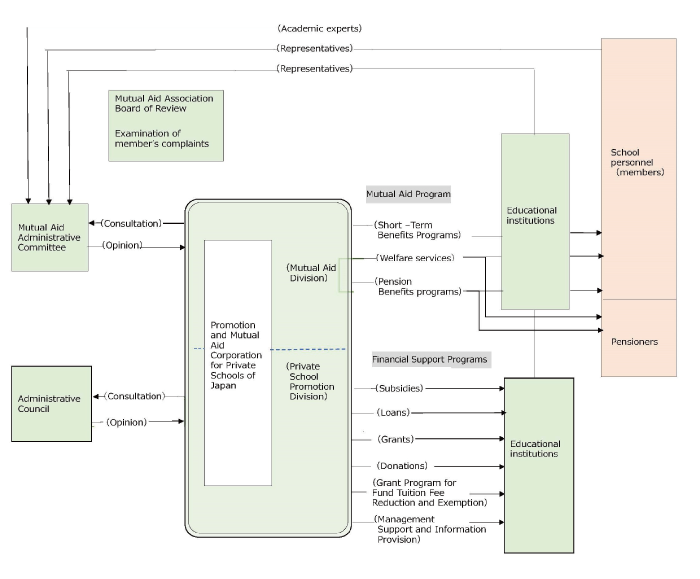- A Mutual Aid System is a system for mutual assistance in which public employees or school personnel working in similar workplaces make monetary contributions to a fund that receives additional support from the government and schools. It helps establish an environment that alleviates worries about illness or old-age livelihood so that the employees can work in good health without these worries.
- The Private School Mutual Aid (PMAC) System aims to facilitate the advancement of private schools and the welfare of their personnel by providing three types of services; namely payment of Short-Term Benefits (health insurance) and Pension Benefits and Welfare Services that help maintain/improve the health of and support the daily livelihood of members and their dependents.
- After joining PMAC, members will need to pay the required premiums from their monthly salaries or bonuses. They will then become entitled to receive Short-Term and Long-Term Benefits and to use the facilities and loan service managed by the welfare program.
- PMAC programs are administered by the Promotion and Mutual Aid Corporation of the Private Schools of Japan.
PMAC
In order to promote the enhancement and improvement of education at private schools, stabilization of their management and the welfare of their employees, PMAC comprehensively and efficiently implements grants of subsidies, provision of loans and other endeavors necessary to support education at private schools. PMAC operates the Mutual Aid System to further assist in the advancement of education at private schools.

- PMAC related documents should be addressed to:
PMAC(Shigaku-Jigyodan in Japanese)
1-7-5, Yushima, Bunkyo-ku, Tokyo, 113-8441 Japan
Telephone: +81 03 3813 5321
PMAC Programs
Short-Term Benefits Program:
Short-Term Benefits are provided when a member or their dependent becomes ill or injured, delivers a child, dies, takes leave from work (not applicable to the dependent), or suffers from a natural disaster.
Pension Benefits Program:
Pension Benefits are provided when a member reaches a certain age, becomes disabled or dies. These benefits are given to a member or their survivors as pension benefits or lump sums.
Welfare Services:
In order to improve the welfare of members and their dependents, services to maintain and enhance health, the operation of hospitals, athletic fields, hotels (Garden Palace), lodging facilities and recreation facilities, acceptance of savings deposit, services for Accumulated Fund Mutual Aid Annuity and Mutual Aid Term Insurance, and loan service are provided.
Financing Resources of PMAC
Short-Term Benefits Program
- In order to maintain a balanced budget for the next few years, the cost required for paying Short-Term Benefits is covered by the premiums and investment income.
Pension Benefits Program
- In order to maintain a balanced budget for the entirety of the Employees’ Pension including plans for private school personnel for approximately the next 100 years, the cost required for paying Employees’ Pension Insurance benefits is covered by the insurance premiums and investment income.
- For personnel at private educational institutions, the national government provides subsidies toward contributions made by beneficiaries to the Basic Pension, and the prefectural governments, with recognition of the importance of the promotion of private schools, provide a subsidy equivalent to 0.8/100 of the Pension Benefits premiums.
- In order to maintain the financial budget for the future, the cost required for paying Retirement Pension Benefits (Private schools version) is covered by the premiums, funds and investment income.
Welfare Services
- As with Short-Term Benefits, in order to maintain a balanced budget for the next few years, the cost required for providing welfare services is covered by the premiums and the income from each facility.

 Japanese Site
Japanese Site Site Map
Site Map